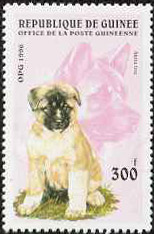Who's a clever boy then?
Recent research on canine cognition
source: Kate Douglas
New Scientist vol 199 no 2670, August 23 2008
starts p 33, 3 pages long
The first Canine Science Forum was held in Budapest, Hungary, in July 2008. One issue discussed was canine cognition. Previously many scientists believed that dogs were more stupid versions of wolves, since their brains are some 10% smaller than those of wolves. Now it is more accepted that domestication has affected canine cognition, for example, dogs appear to have a rudimentary sense of right and wrong, according to University of Colorado's Marc Bekoff. He has studied play in dogs and other animals, and sees play as a way of learning social rules. Meanwhile, University of Vienna's Friederike Range argues that dogs also have an aversion to inequity. In her experiments, dogs ceased to cooperate when not rewarded in the same way as other dogs, for successfully perfoming the same task. Inequity is a value that helps counter freeloading, so promotes social stability.
Dogs have learnt to communicate with humans through barking, argues Peter Pongracz, from Budapest's Eotvos Lorand University. Dog barks can convey emotional states like happiness, aggression and lonliness, and these states can be recognised from barks even by non-dog owning children. Dogs can also understand human attempts to communicate with them, for example through gazing and pointing, as well as through information from human voices. Dogs can also be trained to identify and retrieve toys by name, according to University of Cambridge's Juliane Kaminski. Furthermore, the Hungarian Academy of Science's Joszef Topal sees dogs as capable of learning from one another.
There are debates as to how recent research should be interpreted, including the notion that dogs may have a theory of mind. However, this idea is now more acceptable than it was some years ago.
DO,BT



